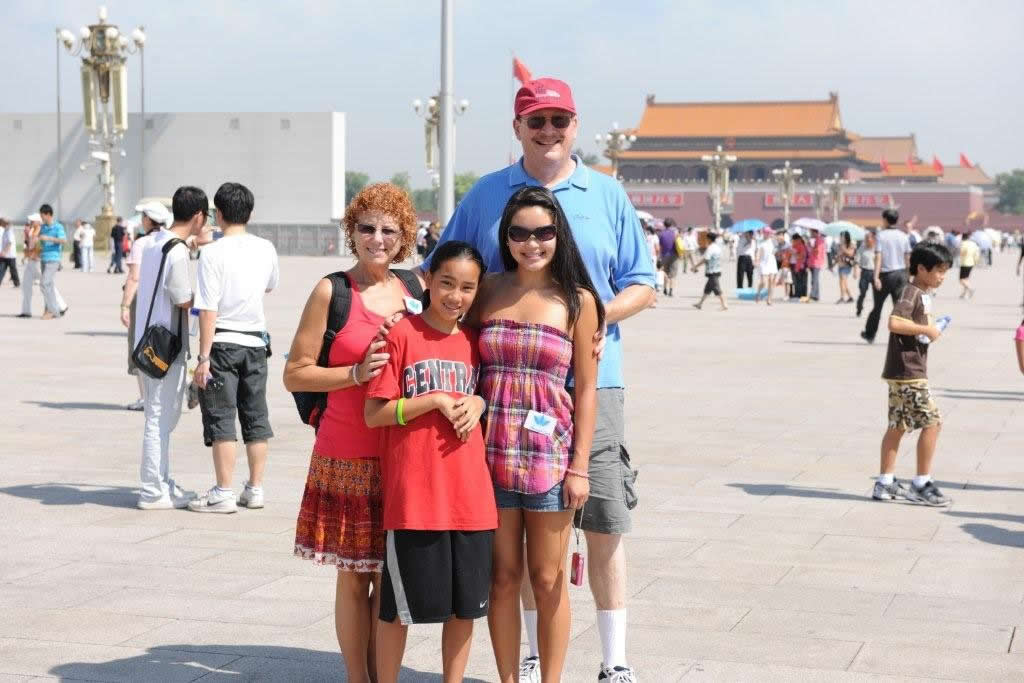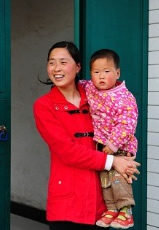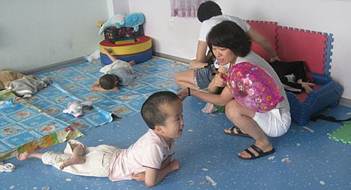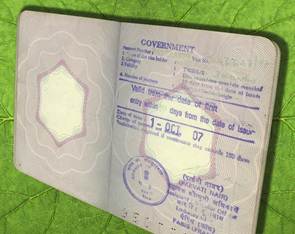Lotus - A trusted name in family travel
My daughters both said their favorite thing was visiting their towns and orphanages. I agree, especially since one of the orphanages was in an area where the official stance is "no visits." Both of these visits were truly special and in different ways, more than we had hoped for. For myself and my husband, seeing our children fall in love with China was the best part of all.
Top 10 Questions Regarding Orphanage Visits
1. What exactly will happen during our orphanage visit?
 This will vary greatly, depending on the orphanage itself, the director and other variable factors, such as how often families return to visit. Sometimes returning families are literally greeted with a firecracker ceremony and at other locations, there is only a short, somewhat perfunctory meeting. There is no one exact “formula” for an orphanage visit. However, most of the time we arrange a meeting with the director, some key staff members, and a lunch time meal where the parties may relax and have some informal visiting. Depending on the time commitment and availability of the director and the interest level of the family, we will work to accommodate spending as much time as is feasible.
This will vary greatly, depending on the orphanage itself, the director and other variable factors, such as how often families return to visit. Sometimes returning families are literally greeted with a firecracker ceremony and at other locations, there is only a short, somewhat perfunctory meeting. There is no one exact “formula” for an orphanage visit. However, most of the time we arrange a meeting with the director, some key staff members, and a lunch time meal where the parties may relax and have some informal visiting. Depending on the time commitment and availability of the director and the interest level of the family, we will work to accommodate spending as much time as is feasible.
 2. My child wants to see the children at the orphanage and hug and hold the babies there. Can we do that?
2. My child wants to see the children at the orphanage and hug and hold the babies there. Can we do that?
As a general rule of thumb, most state-run orphanages aren’t in a position and don’t allow this type of interruption to their daily routine in the care of children in their charge. Remember, the staff members of the orphanage are responsible for the day to day care and visiting and returning families may represent too great an interruption to carrying out their regular responsibilities. They may also shield older children from the view of your returning family. While the staff endeavors to accommodate return visits, they do not want to cause unnecessary pain for those who live at the orphanage. The visit will likely remind those living there that they were not selected to be placed in an adoptive family’s home. If a visiting family is allowed to hold some of the babies or view some of the rooms of an orphanage, it is always best to ask guidance from your local guide on what is allowable and appropriate there at the orphanage.
3. Our family would like to meet with our child’s primary caregiver from the orphanage. Is that possible?
Yes it is typically possible and we arrange it often. However, do keep in mind that if you are returning 10 or more years after an adoption, the caregiver may have moved away or left employment there. The earlier a return trip is planned, the more likely it is to connect with a nanny or caregiver. If the caregiver still works at the orphanage, most directors happily facilitate this connection and it can be a most meaningful moment. Many caregivers excitedly anticipate a baby’s return. However it can be naïve to assume it is always happens this way. Some caregivers have cared for more than one hundred children and can’t remember each child in their charge. Be practical and realistic as you make your trip preparations and discuss expectations with your child.
It is not unusual for families to return and the old orphanage building is gone and to be visiting a new facility. It is important to remember that time does not stand still anywhere. . Just as your child has changed dramatically from when he or she was a baby and was last there, people within your child’ first community of care may have experienced changes as well. The orphanage itself may have changed; a special caregiver may be there or may have moved Attempting to revisit the past, can be a dramatic illustration of the permanency of change in our lives.
4. Will we be allowed to see the orphanage file of my child and what might be in it?
 The practice will vary greatly from orphanage to orphanage. Some directors follow a practice that the child themselves will be granted access to that information at the time she/he becomes of adult age. Quite a few others allow for easy review of the file and a copy of the internal documents to be made. Some orphanages will not grant the request to view the file at all. In cases where families have reviewed the file, they often request to make copies of documents held in it. Typically, documents in an orphanage file include: the child’s abandonment report, possibly a police report, notes or papers left with the child, and possibly medical notes relevant to the child’s first days there.
The practice will vary greatly from orphanage to orphanage. Some directors follow a practice that the child themselves will be granted access to that information at the time she/he becomes of adult age. Quite a few others allow for easy review of the file and a copy of the internal documents to be made. Some orphanages will not grant the request to view the file at all. In cases where families have reviewed the file, they often request to make copies of documents held in it. Typically, documents in an orphanage file include: the child’s abandonment report, possibly a police report, notes or papers left with the child, and possibly medical notes relevant to the child’s first days there.
Sometimes reviewing the file will bring up unexpected challenges, such as receiving conflicting information about the location of the finding spot, or a different birth date than the one you were given for the child. You, as the parent might want to look at the file alone, with only the translator and without the child. If something unexpected is in the file you can take that information and make it available to the child when you feel it is appropriate for them. With that plan in mind, if your child’s file has conflicting information on their date of birth or the finding location, you, as the parent can ask clarifying questions of orphanage personnel at the time. Then, you also then can work through how and when you plan to discuss this with your child. For example, a child finding out she has two different dates given for a birthday can be a big adjustment. You can present this information if/when you have thought through how to best share this with your child. Some helpful ways would allow the child some ownership of the process, after discussing the particulars of how conflicting information can happen. Some families in this situation have chosen to celebrate both-- one as an American birthday-- one as a Asian birthday. Others have disregarded one over the other as more likely; whatever you choose to do, professionals generally recommend you allow the child to participate in the process of making this decision.
5. Is it possible to visit the finding spot of my child?
 Yes, Lotus guides have done this numerous times and they will assist you in accomplishing this task if it’s of interest for your family. Sometimes one parent decides to visit that spot on their own, while the other parent stays with the children, due to concerns that the child is not emotionally ready for this part of their story. This is a very personal decision for each family and only you can determine if this is something you’d like to accomplish. There may be inaccurate or conflicting information regarding this location as well. If all or part of your family chooses to try to locate this spot, anticipate that you or your child may have a strong emotional reaction to this experience.
Yes, Lotus guides have done this numerous times and they will assist you in accomplishing this task if it’s of interest for your family. Sometimes one parent decides to visit that spot on their own, while the other parent stays with the children, due to concerns that the child is not emotionally ready for this part of their story. This is a very personal decision for each family and only you can determine if this is something you’d like to accomplish. There may be inaccurate or conflicting information regarding this location as well. If all or part of your family chooses to try to locate this spot, anticipate that you or your child may have a strong emotional reaction to this experience.
6. What should we anticipate at the finding spot location, and how do we prepare?
Some parents find themselves totally caught off guard by the physical reality of the finding spot itself. Think through some preparation steps for yourself as well as your child. Based on what information you may already have, anticipate possible scenarios and what options you prefer. Is it likely to have changed significantly since your child was placed there? How reliable is the information that you have? Do you have conflicting reports about the finding spot? Do you anticipate being able to visit the area in relative solitude? Is this spot likely to be a crowded spot? Is your child emotionally mature enough to visit this location? These are some questions to think through before arriving at the location.
Also, it’s a good idea to think through options and plans for visiting this locale. Is it in a small, obscure village where visiting foreigners will attract a lot of attention? If you draw a crowd, how does your child handle that? Think through how to make an exit strategy available to your child ahead of time. This allows your child to say something meaningful to you but insignificant to others. It can be a simple, pre-arranged phrase that your child says to you such as “ I really hate yellow umbrellas, don’t you?” This pre-arranged “code” can be easily spoken in public by your child. And, you as the adult can shift into removing your child from the situation without any fanfare or explanations to others as to why you are leaving. Having this option and control over the situation can help alleviate your child’s concerns, and give you a comfort level in knowing how to support them. It is a good idea to walk into this piece of the trip ready to support your child’s connections here that can be placed in context within her (or his) life story.
Some families like to make it a personal and meaningful connection to that site via bringing something from their home, such as a rock from their yard and leave it there; and to pick up a rock from that location and take it home to remember the family connection to the site. This is something you can discuss with your child ahead of time, and ask for her ideas. Is there some family ceremony or other meaningful way that you would like to connect to this part of your child’s history?
7. What is the most surprising aspect of an orphanage visit for visiting and returning families?
 Oftentimes families and children are taken aback at the number of disabled children who reside at an orphanage. Also, if children are not prepared for this fact, it can be overwhelming to them to see a large number of physically disfigured children or mentally impaired children there in the orphanage. In addition, if visiting children meet or see other children their age at the orphanage, it can cause deep reflection regarding why they were selected to receive a forever family and others have remained in institutional care for their lives. Most orphanages are really part of what is called a Social Welfare Institution, which is really a home for elderly residents without families to care for them as well as children who don’t have families. Discussion and preparation regarding differences and similarities in how different countries care for elderly or orphaned children, can bring some understanding for the visit. (See the article Preparation Tips and Projects” http://www.lotustours.net/info/travel/prep1.shtml for more detail on differences and similarities in caring for elderly and children in different countries.)
Oftentimes families and children are taken aback at the number of disabled children who reside at an orphanage. Also, if children are not prepared for this fact, it can be overwhelming to them to see a large number of physically disfigured children or mentally impaired children there in the orphanage. In addition, if visiting children meet or see other children their age at the orphanage, it can cause deep reflection regarding why they were selected to receive a forever family and others have remained in institutional care for their lives. Most orphanages are really part of what is called a Social Welfare Institution, which is really a home for elderly residents without families to care for them as well as children who don’t have families. Discussion and preparation regarding differences and similarities in how different countries care for elderly or orphaned children, can bring some understanding for the visit. (See the article Preparation Tips and Projects” http://www.lotustours.net/info/travel/prep1.shtml for more detail on differences and similarities in caring for elderly and children in different countries.)
8. Who can guarantee that our visit to the orphanage will be approved? No one single person can guarantee access to each orphanage, since each orphanage director has final authority to grant or deny a visit. Additionally, provinces work through a centralized visit request process through the CCAA. The leaders at Lotus Travel have enjoyed much favor and long relationships with orphanage directors throughout China and the CCAA. We have worked closely with orphanage directors for more than a decade and have a strong and reliable network among orphanages throughout China. Lotus team members and leaders have volunteered time to help orphanages in need, such as physically installing and building a library in Liuzhou, purchasing a building heating system for an orphanage in northern China, and funding various orphanage support programs through our Orphan Improvement fund. We have been highly successful in securing requests from the vast majority of returning adoptive families. Each orphanage visit request is handled with great care and we work to ensure the best arrangements that can be accomplished with the orphanage. For families with two or more children, we routinely arrange two or more visits during one trip.
centralized visit request process through the CCAA. The leaders at Lotus Travel have enjoyed much favor and long relationships with orphanage directors throughout China and the CCAA. We have worked closely with orphanage directors for more than a decade and have a strong and reliable network among orphanages throughout China. Lotus team members and leaders have volunteered time to help orphanages in need, such as physically installing and building a library in Liuzhou, purchasing a building heating system for an orphanage in northern China, and funding various orphanage support programs through our Orphan Improvement fund. We have been highly successful in securing requests from the vast majority of returning adoptive families. Each orphanage visit request is handled with great care and we work to ensure the best arrangements that can be accomplished with the orphanage. For families with two or more children, we routinely arrange two or more visits during one trip.
 9. My child is ambivalent about the orphanage visit part of the trip. I am not sure if my child will really want to go through with the visit. What should I do?
9. My child is ambivalent about the orphanage visit part of the trip. I am not sure if my child will really want to go through with the visit. What should I do?
This can be a common challenge. Going ahead and submitting paperwork to have that as an option while in-country is a good idea. For a private tour, or a custom trip, it is easy to opt out of a visit while you are in China if you and your child feel it is too much. Your family can spend the day doing other sightseeing or just visiting the hometown area, etc. Having a thorough discussion with the child before the trip will help the child in deciding if they want to visit or not. Help the child understand what to expect and what not to expect is key to preparing them for this visit. (See Preparation Tips and Projects article for more in-depth information on visit preparationhttp://www.lotustours.net/info/travel/prep1.shtml. There is great value in visiting and exploring the country of your child’s heritage.
10. Our family and travel reunion group would like to bring back something special for the orphanage itself. Can we do this, and if yes, what should we purchase?
For families and groups that would like to offer kindness to the orphanage from which their child came, it is possible to inquire ahead of time if the orphanage has any special need that they would like to fill. Often, it is possible to purchase requested items while in China, such as a CD player and CD tapes with music, or such. A basket of fruit is a welcome  and culturally appropriate gift. It is easily shared among staff and children and is always an appreciated gesture.
and culturally appropriate gift. It is easily shared among staff and children and is always an appreciated gesture.
If the orphanage does not let you know of any special need, some suggested gifts are: school and art supplies; school backpacks (highly favored); candy, and toys; children’s undergarments; clothes for older children as well as clothes for both genders. As for staff gifts, a small scrapbook or photo book of your child’s life can be a particularly meaningful gift for a caregiver, foster mom or orphanage personnel. For a highly detailed listing of gift-giving suggestions for staff members of the orphanage, please see Amy Eldridge’s article on SWI gift giving on our website at http://www.lotustours.net/connect/travel/connect2.shtml